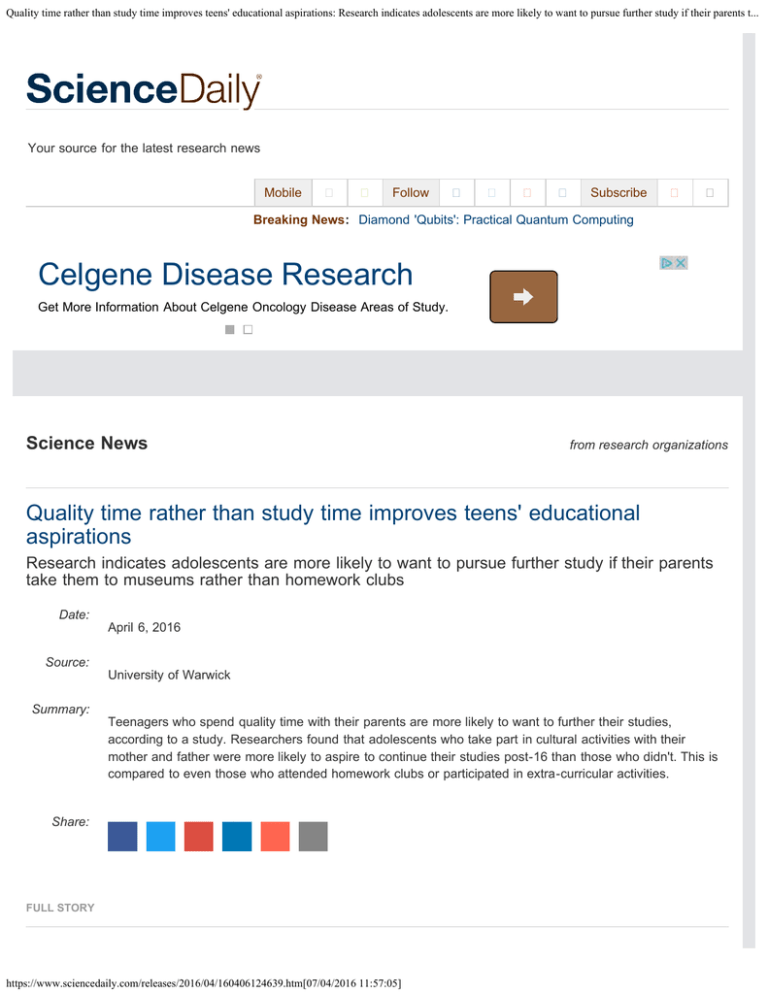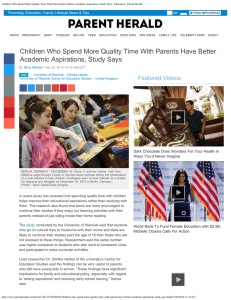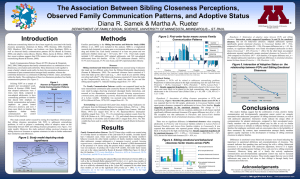Document 12406599
advertisement

Quality time rather than study time improves teens' educational aspirations: Research indicates adolescents are more likely to want to pursue further study if their parents t... Your source for the latest research news Mobile Follow Subscribe Breaking News: Diamond 'Qubits': Practical Quantum Computing Celgene Disease Research Get More Information About Celgene Oncology Disease Areas of Study. Science News from research organizations Quality time rather than study time improves teens' educational aspirations Research indicates adolescents are more likely to want to pursue further study if their parents take them to museums rather than homework clubs Date: April 6, 2016 Source: University of Warwick Summary: Teenagers who spend quality time with their parents are more likely to want to further their studies, according to a study. Researchers found that adolescents who take part in cultural activities with their mother and father were more likely to aspire to continue their studies post-16 than those who didn't. This is compared to even those who attended homework clubs or participated in extra-curricular activities. Share: FULL STORY https://www.sciencedaily.com/releases/2016/04/160406124639.htm[07/04/2016 11:57:05] Quality time rather than study time improves teens' educational aspirations: Research indicates adolescents are more likely to want to pursue further study if their parents t... Teenagers who spend quality time with their parents are more likely to want to further their studies, according to research from the University of Warwick. Researchers found that adolescents who take part in cultural activities with their mother and father were more likely to aspire to continue their studies post-16 than those who didn't. This is compared to even those who attended homework clubs or participated in extra-curricular activities. Dr Dimitra Hartas, associate professor in the Centre for Education Studies, University of Warwick led the research. She said: "Filial dynamics such as emotional closeness to parents and cultural capital were better predictors than more schooldriven parent-child interactions." The study "Young people's educational aspirations: psychosocial factors and the home environment" has been published in the Journal of Youth Studies. It found that there is no shortage in young people's educational aspirations although it uncovered some demographic trends. It found that younger boys were less aspirational than slightly older adolescents and girls in general. The data for the study came from an annual survey, the United Kingdom Household Longitudinal Study conducted by the University of Essex and responses by 10,931 adolescents were analysed (with a sub-sample of 4427 included in the final analyses). Factors relating to family emotional closeness, bullying, friendships, homework, extra-curricular activities and perception of parental interest in the child's education were examined. The researchers measured responses to questions about a variety of topics such as visiting art galleries, discussing books at home, the number of evenings spent doing homework, relationship with siblings and quarrelling with parents. Dr Hartas and her team found that the inclination to solve problems (self-efficacy) was a strong predictor of educational aspiration. Adolescents who indicated they were less confident at tackling problems were 30% less likely to rate gaining GCSEs important. In addition those who expressed a lower level of general well-being were 18% more likely to choose not to go to university. Closeness to parents was an indicator of attitude towards GCSEs; those who did not feel emotionally close to their parents were two times higher to consider GCSEs unimportant. However emotional closeness to parents was not found to be significant in predicting a desire to attend university. What the researchers termed 'cultural capital' or participating in cultural activities also appeared to affect the desire to study further. Those who weren't exposed to cultural activates were 14% and 20% respectively less likely to consider university or GCSEs as important. Those who did go to museums, galleries, concerts etc. were found to be 23% less likely to consider training or employment post-16. Dr Hartas said: "These findings have significant implications for family and educational policy, especially with regard to 'raising aspirations' and reducing early school leaving. They also raise the issue of reconsidering the role of the home environment as a web of emotionally and intellectually charged relationships between parents and children rather than an extension of the school day. "Discussions on young people's educational aspirations should not be polarised but informed by notions of opportunity and what young people make of it." RELATED TOPICS RELATED TERMS Mind & Brain Early childhood education Maternal bond Child Psychology Social cognition Child Development Human brain Parenting Political science https://www.sciencedaily.com/releases/2016/04/160406124639.htm[07/04/2016 11:57:05]


